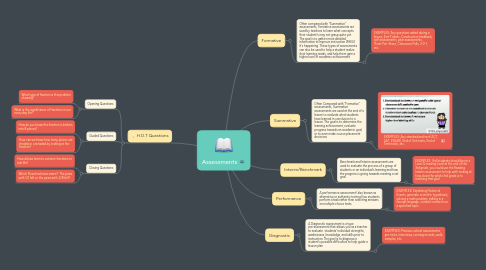
1. H.O.T Questions
1.1. Opening Questions
1.1.1. What type of fraction is this problem showing?
1.1.2. What is the significance of fractions in our every day life?
1.2. Guided Questions
1.2.1. How do you know this fraction is broken into 8 pieces?
1.2.2. How can we know how many pieces are shaded or unshaded by looking at the fraction?
1.3. Closing Questions
1.3.1. How did we learn to connect fractions to real life?
1.3.2. Which Pizza had more eaten? The pizza with 1/2 left or the pizza with 2/8 left?
2. Formative
2.1. Often compared with "Summative" assessments, Formative assessments are used by teachers to learn what concepts their student's may not grasp quite yet. The goal is to gather more detailed information to improve instruction WHILE it's happening. These types of assessments can also be used to help a student realize their learning needs, and help them gain a higher level of academic acheivement
2.1.1. EXAMPLES: Any questions asked during a lesson, Exit-Tickets, Constructive feedback, self assessments, peer assessments, Think-Pair-Share, Classroom Polls, 3-2-1, etc.
3. Summative
3.1. Often Compared with "Formative" assessments, Summative assessments are used at the end of a lesson to evaluate what students have learned in conclusion to a lesson. The goal is to determine the learning achievement, evaluate progress towards an academic goal, or to even make course placement decisions
3.1.1. EXAMPLES: Any standardized test (ACT, SAT, STAAR), End of Unit tests, End of Term tests, etc.
4. Interim/Benchmark
4.1. Benchmark and Interim assessments are used to evaluate the process of a group of students or an individual's learning and how the progress is going towards meeting a set goal.
4.1.1. EXAMPLES: If all students should be on a Level Q reading Level at the end of the 3rd grade, you could use the Reading Interim assessment to help with looking at how close the whole 3rd grade is to reaching that goal.
5. Performance
5.1. A performance assessment (also known as alternative or authentic testing) has students perform a task rather than selecting answers on multiple choice tests.
5.1.1. EXAMPLES: Explaining Historical Events, generate scientific hypothesis, solving a math problem, talking in a foreign language, conduct research on a specified topic.
6. Diagnostic
6.1. A Diagnostic assessment is a type pre-assessment that allows you as a teacher to evaluate students' individual strengths, weaknesses, knowledge, and skills prior to instruction. The goal is to diagnose a student's possible difficulties to help guide a lesson plan
6.1.1. EXAMPLES: Previous school assessments, pre-tests, interviews, running records, work samples, etc.

